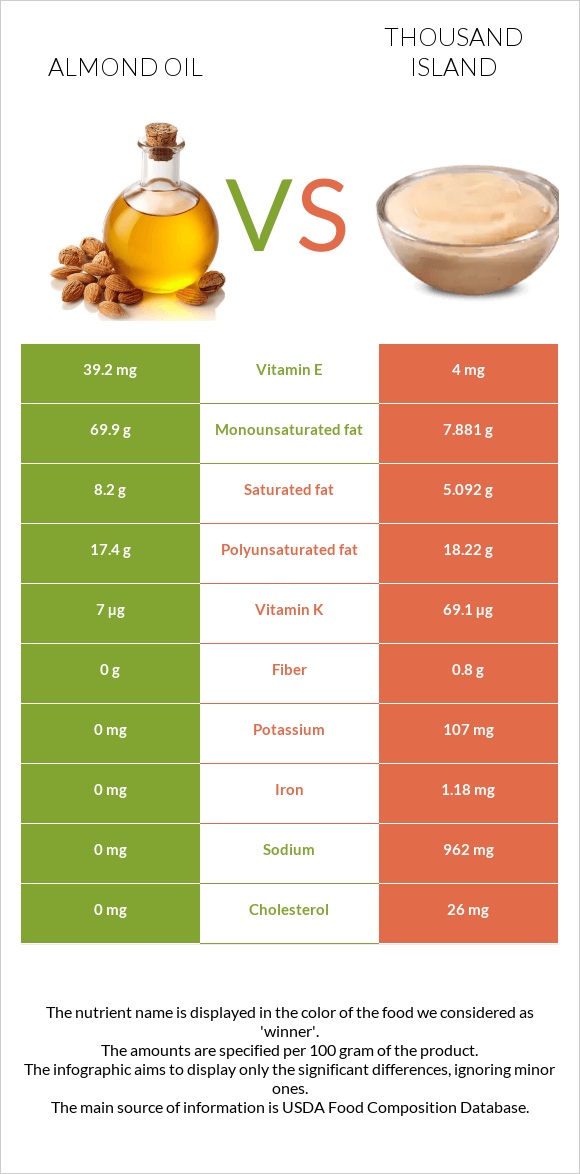Almond oil vs. Thousand island — In-Depth Nutrition Comparison
Compare
What are the main differences between almond oil and thousand island?
- Almond oil is richer in vitamin E, while thousand island is higher in vitamin B1, vitamin K, and iron.
- Almond oil's daily need coverage for vitamin E is 235% higher.
- Thousand island has 2 times less saturated fat than almond oil. Almond oil has 8.2g of saturated fat, while thousand island has 5.092g.
We used Oil, almond and Salad dressing, thousand island, commercial, regular types in this comparison.
Infographic

Infographic link
Mineral Comparison
Mineral comparison score is based on the number of minerals by which one or the other food is richer. The "coverage" charts below show how much of the daily needs can be covered by 300 grams of the food.
| Contains less SodiumSodium | -100% |
| Contains more MagnesiumMagnesium | +∞% |
| Contains more CalciumCalcium | +∞% |
| Contains more PotassiumPotassium | +∞% |
| Contains more IronIron | +∞% |
| Contains more ZincZinc | +∞% |
| Contains more PhosphorusPhosphorus | +∞% |
| Contains more SeleniumSelenium | +∞% |
Vitamin Comparison
Vitamin comparison score is based on the number of vitamins by which one or the other food is richer. The "coverage" charts below show how much of the daily needs can be covered by 300 grams of the food.
| Contains more Vitamin EVitamin E | +880% |
| Contains more Vitamin AVitamin A | +∞% |
| Contains more Vitamin B1Vitamin B1 | +∞% |
| Contains more Vitamin B2Vitamin B2 | +∞% |
| Contains more Vitamin B3Vitamin B3 | +∞% |
| Contains more Vitamin KVitamin K | +887.1% |
All nutrients comparison - raw data values
| Nutrient |  |
 |
DV% diff. |
| Vitamin E | 39.2mg | 4mg | 235% |
| Monounsaturated fat | 69.9g | 7.881g | 155% |
| Vitamin B1 | 0mg | 1.445mg | 120% |
| Fats | 100g | 35.06g | 100% |
| Vitamin K | 7µg | 69.1µg | 52% |
| Sodium | 0mg | 962mg | 42% |
| Calories | 884kcal | 379kcal | 25% |
| Iron | 0mg | 1.18mg | 15% |
| Saturated fat | 8.2g | 5.092g | 14% |
| Cholesterol | 0mg | 26mg | 9% |
| Carbs | 0g | 14.64g | 5% |
| Polyunsaturated fat | 17.4g | 18.22g | 5% |
| Fructose | 4g | 5% | |
| Phosphorus | 0mg | 27mg | 4% |
| Vitamin B2 | 0mg | 0.058mg | 4% |
| Potassium | 0mg | 107mg | 3% |
| Fiber | 0g | 0.8g | 3% |
| Selenium | 0µg | 1.5µg | 3% |
| Vitamin B3 | 0mg | 0.418mg | 3% |
| Protein | 0g | 1.09g | 2% |
| Magnesium | 0mg | 8mg | 2% |
| Calcium | 0mg | 17mg | 2% |
| Zinc | 0mg | 0.26mg | 2% |
| Vitamin A | 0µg | 14µg | 2% |
| Manganese | 0.04mg | 2% | |
| Choline | 0.4mg | 4.6mg | 1% |
| Net carbs | 0g | 13.84g | N/A |
| Sugar | 0g | 15.18g | N/A |
Macronutrient Comparison
Macronutrient breakdown side-by-side comparison
Protein:
0 g
Fats:
100 g
Carbs:
0 g
Water:
0 g
Other:
0 g
Protein:
1.09 g
Fats:
35.06 g
Carbs:
14.64 g
Water:
46.51 g
Other:
2.7 g
| Contains more FatsFats | +185.2% |
| Contains more ProteinProtein | +∞% |
| Contains more CarbsCarbs | +∞% |
| Contains more WaterWater | +∞% |
| Contains more OtherOther | +∞% |
Fat Type Comparison
Fat type breakdown side-by-side comparison
Saturated fat:
Sat. Fat
8.2 g
Monounsaturated fat:
Mono. Fat
69.9 g
Polyunsaturated fat:
Poly. Fat
17.4 g
Saturated fat:
Sat. Fat
5.092 g
Monounsaturated fat:
Mono. Fat
7.881 g
Polyunsaturated fat:
Poly. Fat
18.22 g
| Contains more Mono. FatMonounsaturated fat | +786.9% |
| Contains less Sat. FatSaturated fat | -37.9% |
~equal in
Polyunsaturated fat
~18.22g




